Water
recedes, hope rises:
A collective effort to restore normality :
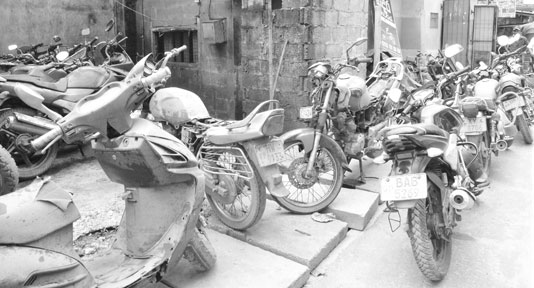 After the recent floods, with the victims gradually moving back to
their houses, Isuri Yasasmin Kaviratne from the Sunday Observer write
about their volunteering experience to help them clean their houses, and
also with the packing and distribution of the dry rations and other
commodities. After the recent floods, with the victims gradually moving back to
their houses, Isuri Yasasmin Kaviratne from the Sunday Observer write
about their volunteering experience to help them clean their houses, and
also with the packing and distribution of the dry rations and other
commodities.
This was the week Colombo ran out of rubber boots and gloves. From
five Arpico Super Centres to Fort, though searched, several volunteer
groups admitted that they couldn't find boots but are still proceeding
with the cleaning, overlooking safety precautions in the face of
urgency; these people in camps need to go home. But many would fall
sick, skin diseases at least, due to the overexposure to the dirty water
and mud, many said.
It is either the mud, or the stains, or the smell; despite how many
times you wash the house, the smell never leaves. Some suggest to leave
the doors open after the cleaning for the fresh air to enter the house,
but the owners do not favour the idea: too many looters around, they
say. The brick houses are easier to clean compared to the wooden houses,
the more you clean the more mud seeps in; absorbed to the wood plans,
was the best guess though no scientific explanation could be found.
Exhaustion
There are those who call the cleaning companies, and those who waited
for youth organisations such as Voice Lanka to support them clean their
houses. Some try to do it on their own. Either way, exhaustion take over
fast not entirely by the labour put into the cleaning, but by
contemplating on the destruction, imagining the people trying to rebuild
themselves from scratch. Like after the tsunami.
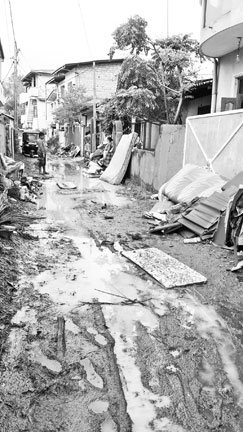 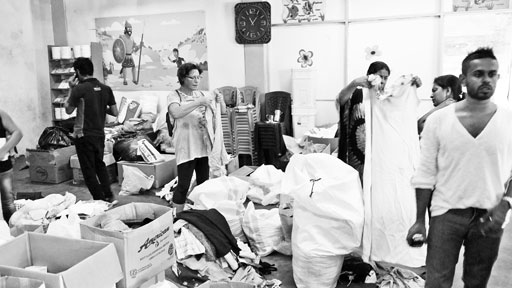 Some
cry. Some are resigned. Some are determined. The disaster has been a
teacher for many. And whatever they feel, they are joining hands to
rebuild. Some
cry. Some are resigned. Some are determined. The disaster has been a
teacher for many. And whatever they feel, they are joining hands to
rebuild.
The continuous rain in the mornings has ensured that some areas
remain flooded and in other areas, the roads remain muddy. The people in
the areas laid down their soggy mattresses and cushions to pave a safe,
comfortable path on the bog their road has become.
The houses that have already been cleaned look bare inside. Sofas,
cushions, mattresses, pillows, all destroyed. Some recommend burning
everything. There's really no point, they say. Broken wood cupboards,
chairs and even books, school text books, novels, dictionaries, get
added to the pile of things to be burnt. They cannot be used, they say.
On the other hand, some try to salvage whatever they can, spreading out
books to dry. The decision depends on how much of mud has gotten into
the books, the cupboards and clothes.
Cleaning kitchens is as wearing as cleaning the school books. The
thorough attention given to cleaning kitchenware always makes one wonder
whether they could be used at all. Thus most of the kitchen equipment
end up in garbage.
Lotus pond
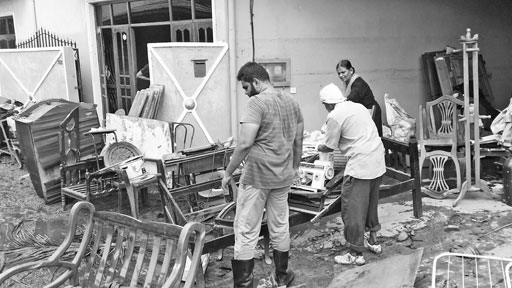 People
need their lives rebuilt. They may have personal savings for that, they
may not. But compensation should be given. Visiting houses made many of
their inhabitants tell stories about how boggy lands were filled and
sold for various purposes, causing more and more floods, such as the
miles long lotus pond in Kohilawatta in Wellampitiya that used to
welcome the excess water before it was filled and sold. Some say that a
malfunction in the 'Moya Kata' caused the floods. People
need their lives rebuilt. They may have personal savings for that, they
may not. But compensation should be given. Visiting houses made many of
their inhabitants tell stories about how boggy lands were filled and
sold for various purposes, causing more and more floods, such as the
miles long lotus pond in Kohilawatta in Wellampitiya that used to
welcome the excess water before it was filled and sold. Some say that a
malfunction in the 'Moya Kata' caused the floods.
Some say that the drainage system was narrowly built leaving little
space for water to seep out that causes continuation of floods. Amidst
all this, people are trying to stand up, like phoenix, though it was
water, not fire that burnt everything they own.
Among the many who volunteered, formed organisations, the Sunday
Observer spoke to a few to record their work during the time of need.
Voice Lanka
Immediately after the floods, Voice Lanka turned their office into an
operation focal point where dry rations and clothes are stored and
distributed from. The Founder of Voice Lanka, Moses Akash de Silva said
that the relief work is done in three stages; the Immediate Relief Work,
Rebuilding and Re-establishing, and Post Relief Work.
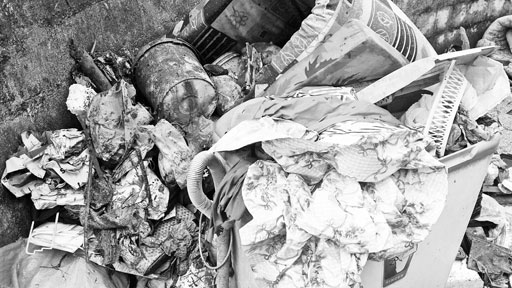 During
the Immediate Relief Work phase, they reached out to nearly 25,000
people and 4100 families by providing them with clean drinking water,
dry rations, clothing and other essential items. During
the Immediate Relief Work phase, they reached out to nearly 25,000
people and 4100 families by providing them with clean drinking water,
dry rations, clothing and other essential items.
"We are currently entering the second phase, Rebuilding and
Re-establishing, where they were cleaning and building existing houses,
and keep providing the affected with clothes and medicine and other
necessities," de Silva said.
He said that the Organisation bought a small boat immediately after
the floods to rescue people and continued to use it to reach out the
people stranded in farthest corners to distribute aid.
De Silva said that they even went into the floods to bring the
wedding dress of a young girl from her home, who was devastated that she
became homeless the day before the wedding.
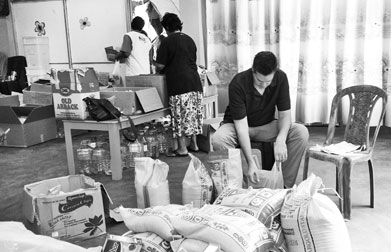 The
office of Voice Lanka where dry rations and clothes were collected,
sounded and felt like a beehive, some bringing dry rations, some put
them into separate parcels for distribution, some folding and
categorizing clothes and noting down what they are missing..., medicine
and toiletries and other items such as baby diapers are put into the
distribution bags separately, and a recently received set of flasks are
to be distributed too, once the people settle down. The
office of Voice Lanka where dry rations and clothes were collected,
sounded and felt like a beehive, some bringing dry rations, some put
them into separate parcels for distribution, some folding and
categorizing clothes and noting down what they are missing..., medicine
and toiletries and other items such as baby diapers are put into the
distribution bags separately, and a recently received set of flasks are
to be distributed too, once the people settle down.
The post relief work involves individual cases and the general
livelihood of communities and affected families as well as helping
school children with supplies, uniforms and replacing household items
that were lost due to floods.
Google form
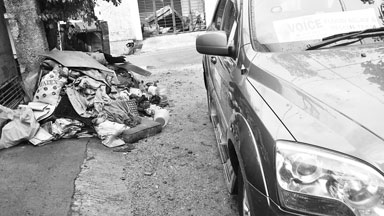 Fayaz
Mahroof said that he and few of his friends bought a domain to set up
the flood relief website after realizing that there are many who wanted
to help and many who needed help but no one to link these two groups. In
the site, he added a google form where the name, place, contact number
and what is needed can be added in detail, and exhibit the inputs in a
public Excel sheet. Fayaz
Mahroof said that he and few of his friends bought a domain to set up
the flood relief website after realizing that there are many who wanted
to help and many who needed help but no one to link these two groups. In
the site, he added a google form where the name, place, contact number
and what is needed can be added in detail, and exhibit the inputs in a
public Excel sheet.
"To help people to use this facility, I also started two hashtags, #needLK
and #availableLK and after a day or two, it got picked up, so, now we
call and double check whenever we get requests for aid and link them up
with someone who has similar items #availableLK" he said that initially,
people didn't know the extent of the damage and many wanted a "blank
cheque", but with the introduction of the hashtags, the interaction
became smoother.
He said that he didn't get to keep tab on the number of people they
reached out to and added that the Disaster Management Centre's delays
should be noted as lessons learnt. |

